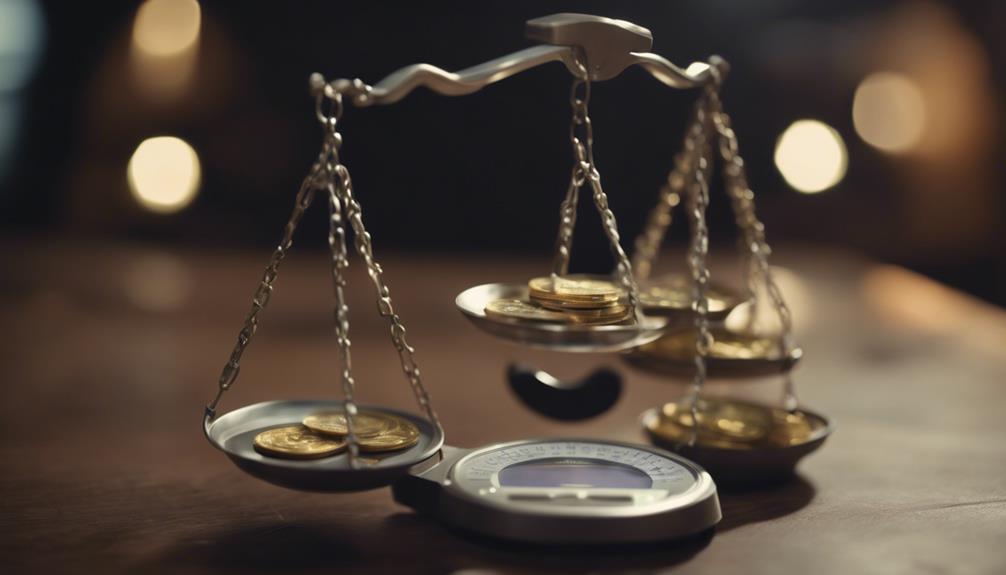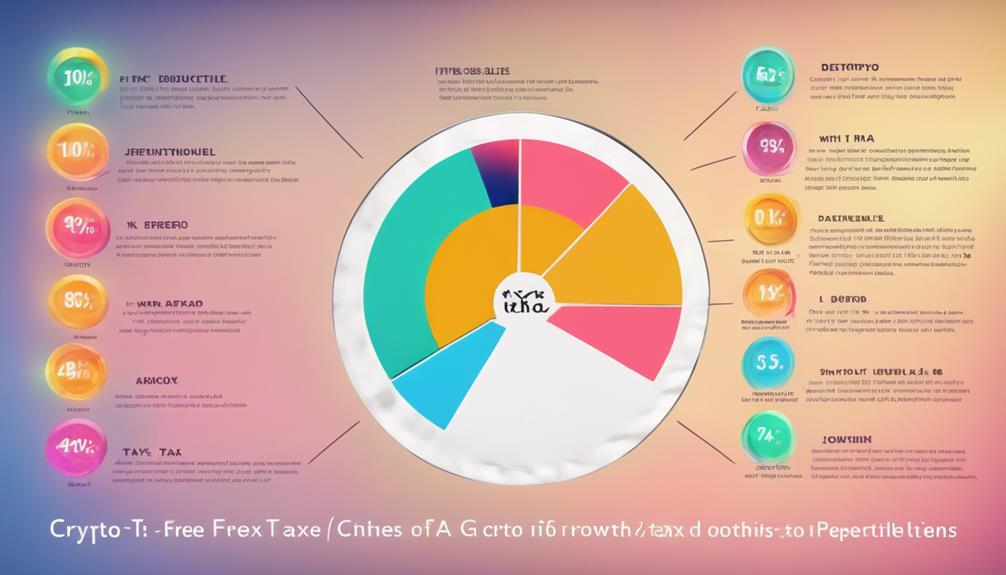Entering the realm of Crypto IRAs offers tax advantages, diversification, and growth potential for our retirement planning. Similar to traditional and Roth IRAs, these accounts provide tax-deferred growth and exposure to a unique asset class, although risks such as high volatility and security concerns should be noted. Understanding tax implications and the importance of diversification are crucial. Selecting reputable custodians, assessing compliance requirements, and staying updated on investment options are vital steps. When considering a Crypto IRA, delving deeper into the specifics will help make informed decisions for a strong retirement savings strategy.
Key Takeaways
- Consider tax advantages and risks of crypto IRAs.
- Evaluate benefits of diversification in a Crypto IRA.
- Understand differences from traditional retirement accounts.
- Choose a reputable custodian for compliance and security.
- Stay informed on regulations and SEC guidelines for Crypto IRAs.
Potential Benefits of a Crypto IRA

Investing in a Crypto IRA can offer individuals tax advantages similar to those found in traditional and Roth IRAs. By holding cryptocurrencies within an IRA, investors can benefit from tax-deferred growth, just like with other retirement accounts. This tax advantage allows investments to grow without being taxed annually, potentially leading to significant savings over time.
Additionally, cryptocurrencies in IRAs can contribute to portfolio diversification. Including digital assets in a retirement account can provide exposure to a unique asset class that may not move in correlation with traditional investments like stocks and bonds. Diversification is key to managing risk, and cryptocurrencies can play a role in spreading investment exposure across different types of assets.
Moreover, the tax treatment of trading cryptocurrencies within an IRA is comparable to trading stocks, offering simplicity and consistency in tax reporting. Overall, a Crypto IRA presents opportunities for tax efficiency and portfolio diversification that can enhance a well-rounded investment strategy.
Risks Associated With Crypto IRAS

While Crypto IRAs offer potential benefits such as tax advantages and portfolio diversification, it's important to consider the risks associated with these investment vehicles. When contemplating investing in a Crypto IRA, individuals must be mindful of the high volatility inherent in the cryptocurrency market. This volatility can lead to significant losses due to sudden price swings, impacting the value of the IRA. Additionally, security concerns pose a significant risk as cryptocurrencies are vulnerable to hacking and cyberattacks, potentially resulting in the loss of the invested funds.
To further understand the risks associated with Crypto IRAs, let's explore the following table:
| Risks | Description |
|---|---|
| High Volatility | Cryptocurrency prices can fluctuate dramatically, leading to investment instability. |
| Significant Losses | Sudden price drops can result in substantial financial losses for investors. |
| Security Concerns | Cryptocurrencies are susceptible to security breaches, risking the loss of assets. |
| High Fees | Some Crypto IRA providers may charge high fees for account maintenance. |
Tax Advantages of Crypto IRAs

Discussing the tax advantages of Crypto IRAs reveals the potential benefits that investors can leverage when incorporating cryptocurrencies into their retirement accounts. Cryptocurrencies held in IRAs are taxed as property by the IRS, offering unique advantages.
Custodians are mandated to include cryptocurrencies in IRAs, enabling investors to diversify their portfolios with digital assets. Self-directed IRAs, known for allowing alternative investments, such as cryptocurrencies, provide individuals with greater control over their retirement savings. Companies like BitIRA and Bitcoin IRA specialize in assisting investors in seamlessly integrating cryptocurrencies into their IRAs.
Utilizing tax strategies within IRAs can help individuals avoid substantial capital gains taxes on their cryptocurrency investments. By strategically managing trades and holdings within the IRA structure, investors can potentially reduce their tax liabilities, leading to more significant long-term gains. Understanding the tax advantages of cryptocurrency IRAs is important for maximizing the benefits of this investment avenue and optimizing retirement savings.
Importance of Diversification in Crypto IRAs

To optimize the benefits of a Crypto IRA, understanding the significance of diversification is key in spreading risk and enhancing long-term growth potential. Diversification in Crypto IRAs involves investing in a variety of cryptocurrencies and digital assets. Here are three reasons why diversification is important in managing a Crypto IRA effectively:
- Risk Management: Including different types of digital assets in a Crypto IRA helps mitigate the impact of price fluctuations within the cryptocurrency market. By spreading investments across various assets, the overall risk is distributed, reducing the vulnerability to volatility in any single asset.
- Performance Balance: Proper diversification can help balance the overall performance of the Crypto IRA. Allocating funds across various crypto projects and tokens can optimize returns by capturing growth opportunities in different segments of the digital asset market.
- Long-Term Growth Potential: A well-diversified Crypto IRA portfolio can enhance long-term growth potential and reduce exposure to risks associated with individual cryptocurrencies. By spreading investments, investors can potentially benefit from the growth of multiple assets over time, thereby increasing the overall value of the IRA.
Comparing Crypto IRAs to Traditional Retirement Accounts

Comparing Crypto IRAs to Traditional Retirement Accounts reveals significant differences in investment options and regulatory considerations. When considering a Crypto IRA versus a traditional IRA or Roth IRA, investors must weigh the unique benefits and risks associated with each type of account. Below is a table outlining key differentiators between Crypto IRAs and Traditional Retirement Accounts:
| Aspect | Crypto IRA | Traditional Retirement Account |
|---|---|---|
| Investment Options | Cryptocurrencies, ICOs, tokens, etc. | Stocks, bonds, mutual funds |
| Regulatory Oversight | Less regulated due to crypto volatility | Highly regulated by SEC |
| Tax Considerations | Tax-deferred growth potential | Tax advantages based on account type |
| Diversification | Opportunity to diversify with digital assets | Traditional assets for diversification |
Crypto IRAs offer a unique opportunity to invest in digital assets within a retirement account, allowing for diversification beyond traditional investment options. Understanding the differences in regulatory oversight and tax implications is essential when deciding between a Crypto IRA and a Traditional Retirement Account.
Steps to Open a Crypto IRA

When opening a Crypto IRA, the first step involves choosing a custodian that aligns with your investment goals.
Once you've selected a custodian, you'll need to fund your account to kickstart your cryptocurrency investments.
Choosing a Custodian
Researching custodians like BitIRA and Bitcoin IRA is vital when considering including cryptocurrencies in your IRA. When choosing a custodian for your self-directed IRA account, consider the following:
- Evaluate custodian fees and services to guarantee a seamless crypto IRA experience.
- Choose a custodian that complies with IRS reporting duties for crypto in IRAs.
- Verify the security measures and custody protocols of the custodian for protecting crypto assets.
Selecting the right custodian is essential for the success of your Bitcoin IRA. By conducting thorough research and considering these factors, you can make sure that your crypto assets are in safe hands and that you comply with all relevant regulations for your IRA.
Funding Your Account
To open a Crypto IRA and start funding your account, first make sure you have selected a custodian that supports cryptocurrency investments. Opening a self-directed IRA is the initial step, ensuring you have the flexibility to invest in digital assets.
Once established, you can transfer funds from your current retirement account or contribute directly to your crypto IRA. These funds can then be utilized to acquire a variety of cryptocurrencies such as Bitcoin or Ethereum.
It's important to adhere to IRS regulations when funding your crypto IRA to maintain tax compliance. Engaging with a reputable custodian for your self-directed IRA can simplify the funding process and offer valuable advice on investment opportunities within the field of cryptocurrency investments.
Selecting Crypto Assets
When building a diversified Crypto IRA, our primary focus lies in selecting from a wide array of cryptocurrencies that includes options such as Bitcoin, Ethereum, and Litecoin. To make informed decisions for our retirement savings plan, we should consider the following:
- Diversification: Allocate investments across different digital assets to spread risk.
- Historical Performance: Evaluate past performance to gauge potential future returns.
- Market Trends: Stay updated on market trends to capitalize on opportunities.
Regulations Impacting Crypto IRAs

The regulatory landscape for Crypto IRAs can be intricate, with compliance requirements that must be carefully followed. Understanding the impact of SEC guidelines is essential when considering incorporating cryptocurrencies into retirement accounts.
Regulatory Landscape for Crypto IRAS
Understanding the regulatory landscape surrounding Crypto IRAs requires a keen grasp of the evolving framework governing these alternative investment vehicles.
- IRS regulations: Cryptocurrency IRAs aren't officially recognized by the IRS; however, cryptocurrencies have been taxed as property since 2014.
- Property taxation: The IRS taxes cryptocurrencies held in IRAs as property, impacting the way investors manage their tax obligations.
- Security and custody requirements: Custodians are mandated to include cryptocurrencies in IRAs, necessitating adherence to security and custody requirements to protect investor assets.
Navigating the regulatory environment for Crypto IRAs demands a thorough understanding of IRS regulations, property taxation implications, and the stringent security and custody standards in place to safeguard these alternative assets.
Compliance Requirements for Crypto IRAS
Mastering the intricate regulatory landscape of Crypto IRAs demands a sharp awareness of compliance requirements impacting these alternative investment vehicles. When considering including cryptocurrency in IRAs, it's essential to engage custodians due to the lack of official recognition by the IRS.
Self-directed IRAs often permit alternative assets like cryptocurrencies, with companies such as BitIRA and Bitcoin IRA offering custodial services to facilitate this process. However, the security and custody demands for holding cryptocurrency in IRAs can result in higher fees for investors.
Regulatory bodies like the CFTC and SEC caution against fraudulent companies offering crypto IRA services, emphasizing the need for thorough due diligence. Understanding these compliance requirements is vital for successfully incorporating cryptocurrencies into IRAs.
Impact of SEC Guidelines
Understanding the regulatory landscape of Crypto IRAs requires a keen awareness of how SEC guidelines impact the world of cryptocurrency investments.
- SEC Guidelines: The SEC plays an important role in shaping regulations that govern crypto IRAs, emphasizing investor protection and market integrity.
- Investor Protection: Compliance with SEC guidelines is vital to safeguard investors' interests and uphold transparency in the crypto IRA market.
- Market Integrity: By focusing on preventing fraud and manipulation, SEC regulations aim to maintain the integrity of the cryptocurrency investment space.
Adhering to these guidelines is essential for a secure and compliant crypto IRA investment, providing peace of mind for investors seeking to navigate this evolving financial landscape.
Considerations Before Investing in a Crypto IRA

Before venturing into a Crypto IRA, it is essential to carefully consider various factors to make informed investment decisions. One crucial aspect to evaluate is the tax implications associated with digital assets held in a retirement savings account. Cryptocurrencies are treated as property by the IRS, subjecting them to capital gains taxes. However, utilizing tax strategies within an IRA can help mitigate these taxes, with Roth IRAs offering the potential for tax-free capital gains. Another consideration is the necessity of custodians to include cryptocurrencies in IRAs. Self-directed IRAs often permit alternative assets like crypto, and companies such as BitIRA and Bitcoin IRA can assist investors in navigating this process. It is also vital to understand that trading within an IRA carries similar tax treatment to trading stocks, providing potential advantages for investors.
| Factors to Consider | Details |
|---|---|
| Tax Implications | Cryptocurrencies taxed as property; tax strategies in IRAs can reduce capital gains taxes |
| Custodians and Self-Directed IRAs | Custodians needed for including crypto in IRAs; self-directed IRAs may allow alternative assets |
| Assistance from Companies | Companies like BitIRA and Bitcoin IRA can help investors include cryptocurrencies in their IRAs |
| Trading within an IRA | Similar tax treatment to trading stocks; offers potential advantages for investors |
Expert Insights on Crypto IRAs

Discovering the domain of Crypto IRAs reveals valuable insights from experts in the field. When contemplating the integration of digital assets into retirement accounts, expert opinions shed light on critical aspects. Here are three key insights to bear in mind:
- Tax Strategies:
Experts emphasize the significance of employing tax-efficient strategies within Crypto IRAs. By leveraging tax-advantaged accounts like Roth IRAs, investors can potentially enjoy tax-free capital gains on their digital assets. Understanding the tax implications and utilizing appropriate strategies can help individuals navigate the complex landscape of cryptocurrency taxation effectively.
- Roth IRA Benefits:
Experts often highlight the advantages of Roth IRAs when incorporating digital assets. Roth IRAs offer a tax-advantaged way to invest in cryptocurrencies, allowing investors to potentially grow their wealth tax-free over time. Exploring the benefits specific to Roth IRAs can aid in making informed decisions regarding Crypto IRAs.
- Diversification with Digital Assets:
Experts commonly advocate for diversifying retirement portfolios by including digital assets through Crypto IRAs. Diversification can help mitigate risk and enhance overall portfolio resilience. Understanding how digital assets fit into a diversified investment strategy is essential for maximizing long-term growth potential.
Frequently Asked Questions
Is Crypto IRA a Good Idea?
When pondering if a crypto IRA is a good idea, it's vital to weigh the potential benefits and risks. Cryptocurrency IRAs offer tax advantages and a way to diversify retirement portfolios. However, they also come with volatility and regulatory uncertainties.
Engaging a trustworthy custodian and understanding the market are key steps to guarantee a successful crypto IRA investment. Conducting thorough research and consulting with financial experts can help make informed decisions.
What Is the Safest Crypto Ira?
When considering the safest crypto IRA, stablecoins like Gemini Dollar (GUSD) stand out for their stability and regulation. GUSD's peg to fiat currencies minimizes price volatility and offers a secure option for long-term investments.
Regulated by the New York State Department of Financial Services, GUSD provides an added layer of security. Choosing a crypto IRA with stablecoins like GUSD can help mitigate the high volatility risks associated with traditional cryptocurrencies.
Is Crypto a Good Retirement Plan?
Yes, crypto can be a good retirement plan if diversified properly. Balancing traditional options like Roth IRAs with crypto IRAs can mitigate risk.
Understanding tax implications, market volatility, and long-term goals is vital. Professional guidance aids in crafting a robust retirement strategy.
Monitoring regulations and staying informed on crypto trends are essential for a successful retirement plan that incorporates cryptocurrencies.
What Is the Difference Between a Roth IRA and a Crypto Ira?
When comparing a Roth IRA to a Crypto IRA, the key difference lies in the investment options. A Roth IRA focuses on traditional assets for retirement savings, while a Crypto IRA allows for investing in digital currencies.
This shift from conventional to digital assets impacts the risk and potential returns associated with each type of account. Understanding these distinctions is essential for informed retirement planning and investment decisions.
What are the benefits of investing in cryptocurrency through an IRA?
Investing in Ethereum IRA offers tax advantages and potential growth in the cryptocurrency market. With a self-directed IRA, individuals can diversify their retirement portfolio and enjoy the flexibility to invest in digital assets. This allows for long-term potential gains and the ability to secure a financial future with cryptocurrency.
Conclusion
To sum up, investing in a Crypto IRA can offer potential benefits such as diversification and tax advantages. According to a recent survey, over 40% of Americans are considering adding cryptocurrencies to their retirement portfolios.
However, it's essential to weigh the risks and regulations associated with Crypto IRAs before making any investment decisions. By staying informed and seeking expert guidance, individuals can make informed choices to secure their financial futures.











